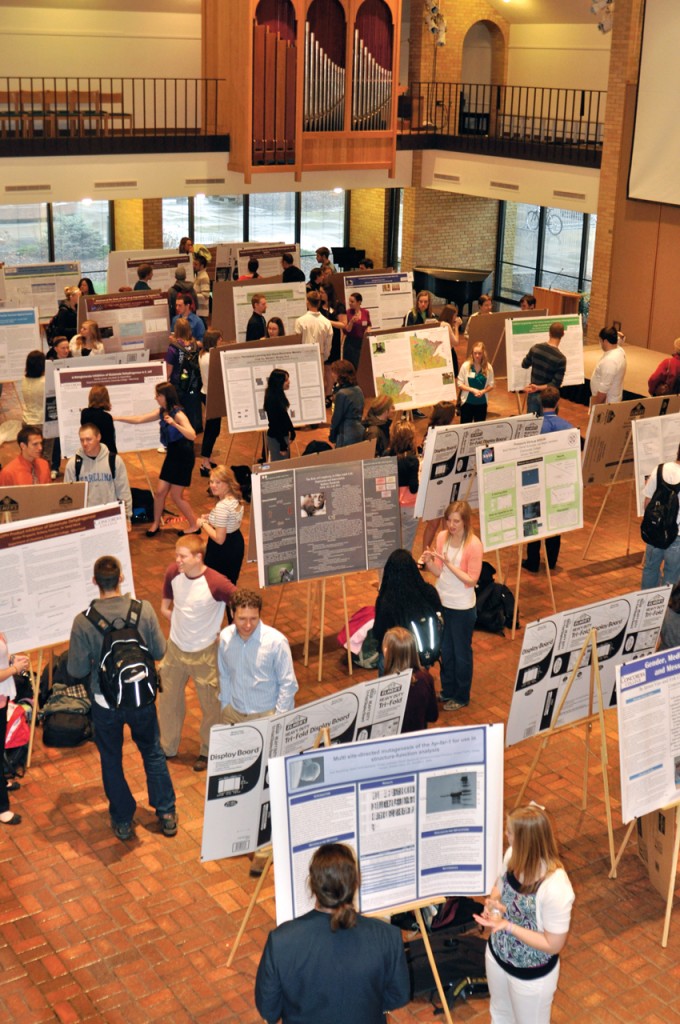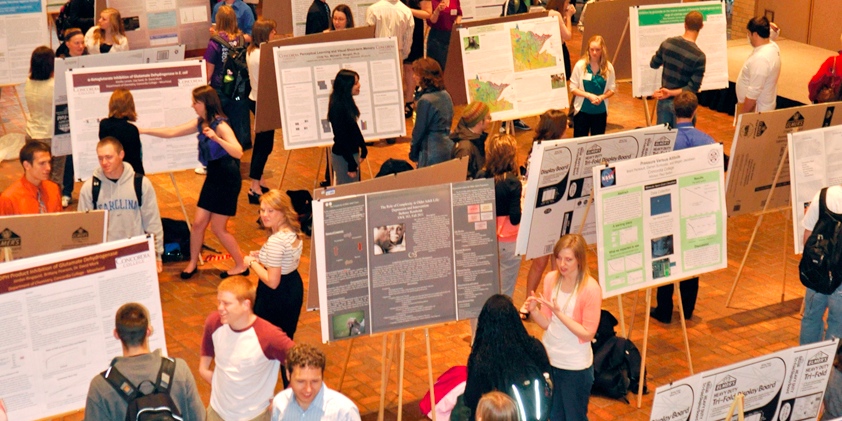
Once a year, Cobbers gather together from disciplines across campus in a showcase of academic achievement called The Celebration of Student Scholarship. This showcase, which took place on April 12 and 13, is an opportunity for students to present research that they have conducted throughout the year. Only in its third year, the event has already grown to almost double its original size.
Nathalie Fida Lassang, a senior biology and chemistry major, has presented at the Celebration of Student Scholarship since she was a sophomore. The benefits of the event that recognized student research were unquestionable to her. When asked what she has learned the most, Lassang could narrow it down to one thing: communication.
“As scientists, we’re not taught how to talk, especially to non-scientists,” Lassang said.
Students can choose between giving a lecture on their research or creating a poster. The lectures are given one at a time to large audiences, whereas the posters are all set up at once in the Centrum and the audience comes to you. Because of this, Lassang has really enjoyed doing the poster presentations part of the Celebration, which allows her to have one-on-one time with an audience in order to explain her research.
“If you’re not a scientist, you can come talk to me, and I can explain it in a way you will understand,” she said.
The necessity of this skill of communication became evident when Lassang began explaining the research that she has presented at the Celebration, including one on the effects of Wolfgang Amadeus Mozart’s music on Multiple Sclerosis and one on systemic lupus erythematosus.
However, in addition to communication between Lassang and her audience, Lassang also believes the communication that happens between departments on campus is also a major benefit of the Celebration of Student Scholarship.
“What I have enjoyed is not just being able to communicate what I do but also learning what other departments are doing,” Lassang said.
There are not many other opportunities for this kind of interdisciplinary communication on campus, she said.
Psychology professor Susan Larson is the director of undergraduate research, scholarship and national fellowships and has coordinated the event since its conception. According to Larson, at least 16 departments were represented in this year’s Celebration of Student Scholarship, with the majority of the poster presentations coming from the sciences and oral presentations made by students from many different disciplines.
Caitlyn Schuchhardt, a senior English literature major, contributed to this variety with her presentations: one on Salman Rushdie’s “Shalimar the Clown,” one on the role of art and activism in addressing environmental activism issues and one on a research project she had done while in India fall semester.
Schuchhardt has found that presenting at the Celebration of Student Scholarship has been great practice in getting over a fear of public speaking.
“I hated public speaking, but now I’ve gotten to a point where I realize it’s not as scary as I thought it was,” Schuchhardt said. “I’ve realized how valuable it can be in helping you to organize your thoughts and convey your thoughts to other people.”
In addition, Schuchhardt encourages other students to take part in the Celebration of Student Scholarship because of its help in preparing for graduate school.
“They want to see that you’ve done more than just write the paper,” she said. “They want to see that you’ve made it accessible.”
“One of the things I hope it will do is provide opportunities for students to realize what their potential is,” said Larson.
When Larson came to Concordia, one of the things she was passionate about was helping Concordia further develop its research program. She could recall how influential the research that she did during her college years was on the direction her life took.
“It made me realize that I was interested in an academic position,” she said. But more than that, “It resulted in me being a more sophisticated thinker. It extends beyond career choice.”
Her passion for providing opportunities for student research and creating the Celebration of Student Scholarship as a venue to share the research that is happening on campus has allowed the event to grow in the three years since it was formed.
In 2010, there were 18 oral presentations and 33 poster presentations. This year, there were 31 oral presentations and 50 poster presentations. One of the reasons for this growth could be the higher amount of awareness that there now is of the event on campus. Larson hopes that the event will only continue to grow and that there will be even greater involvement.
Even though this was Lassang’s last year to be involved in the Celebration of Student Scholarship, she encourages future Cobbers to attend the event even if they aren’t presenting.
“Go and see what your peers are doing and why they’re doing what they’re doing,” she said. “Especially first-year students who aren’t sure what you want to do. Not only will it help you generate ideas, but you will learn a lot.”

